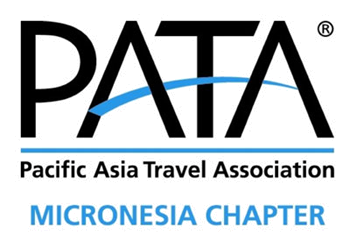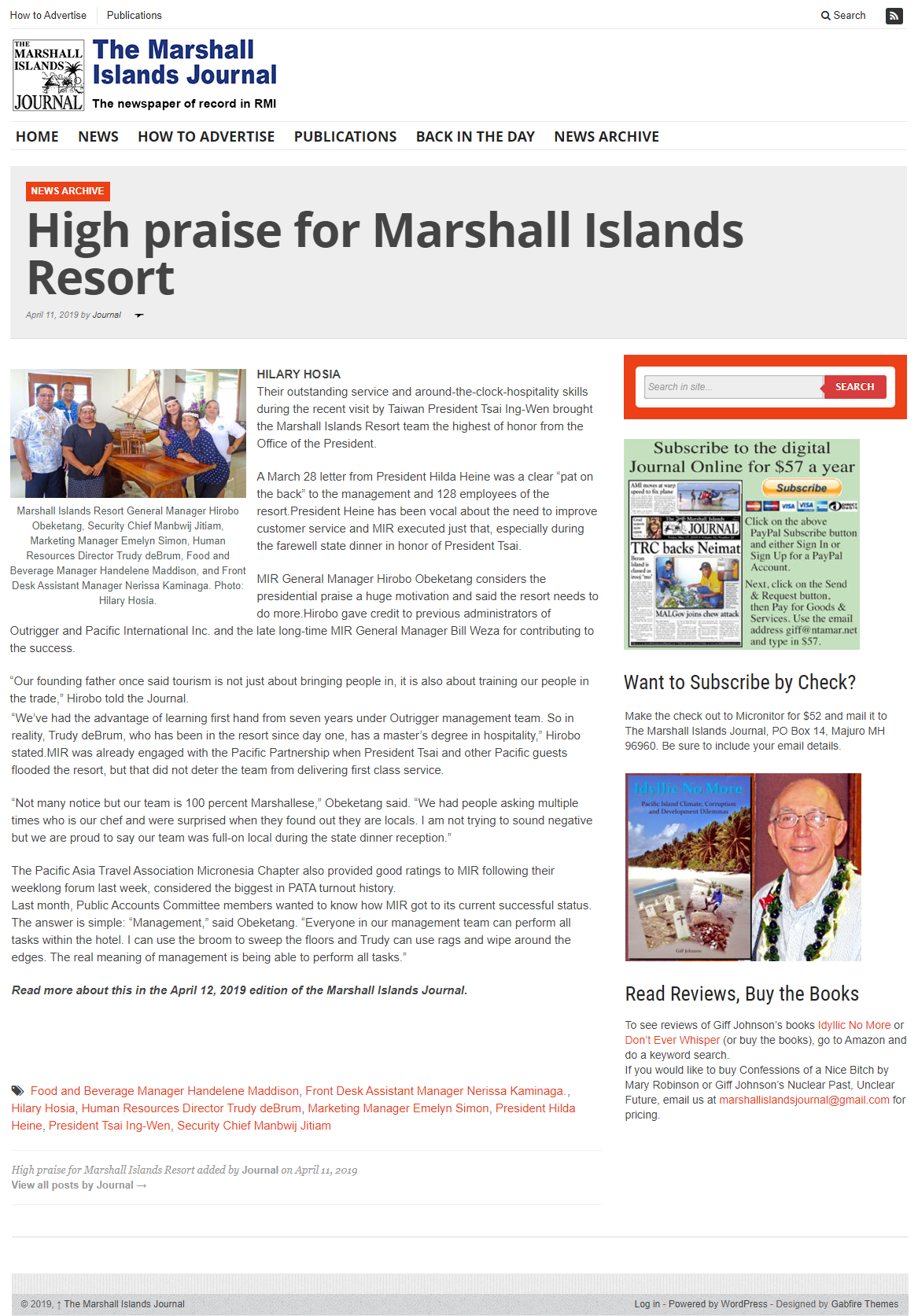The ocean is an essential element to our everyday lives and to combat climate change today would require much more effort in ocean conservation and resiliency. The Pacific Asia Travel Association (PATA) Youth webinar held on Tuesday, January 31st welcomed three guest speakers in the tourism sector Dmitri Cooray, Deputy Managing Director of Jetwing Hotels, Susanne Etti, Global Environmental Impact Manager from Intrepid Travel and Janine Tewid, Marketing Representative, Palau Visitors Authority.
The webinar had an international audience of over 200 youth.
The webinar speakers touched on the impact of the tourism industry on the maritime environment and how we all are working to mitigate them. The speakers will also share how the industry can contribute to ocean conservation from a tourist perspective. Ms. Janine Tewid highlighted some of Palau’s works in the ocean conservation space such as clam planting, turtle releasing and beach & coastal cleanups. She also shares how Palau Visitors Authority contributes to knowledge sharing regarding responsible practices. For instance, social media challenges and activities which spark environmental consciousness and sharing information on how wearing reef-safe sunscreen can reduce one of the stressors on our reefs and ocean.
Furthermore, she highlights the organization’s no plastic initiative. With PVA involved in assessing Palau’s current and potential attractions, the organization hopes to encourage state governments and community members when developing tours to demonstrate the same no-plastic spirit and other sustainable tourism practices.
Apart from PVA, Ms. Tewid speaks on the policies set forth in the tourism industry and how the rest of the world can do the same. For example, tour operators are required to provide their customers with a reusable alternative to disposable plastic or polystyrene cups, water bottles, and drinking straws as well as to provide their customers with a reusable alternative to disposable plastic or polystyrene food containers. She also shares during the webinar, the Our Ocean Conference we hosted in 2022. As a youth herself, she proudly highlighted one of the unique components of the conference and that was the integration of the youth delegation in the plenary and as panelists. In addition, this portion of the conference was also managed by Palauan youth.
Education plays an imperative role in sustaining and preserving our environment. This webinar allowed for PVA to underscore Palau’s initiatives and practices particular to ocean conservation.
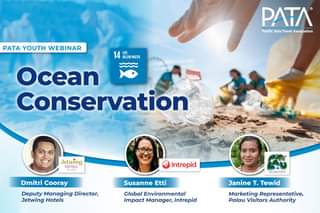
FSM Department of Resources & Development (R&D)
First Lady Edwin Opens Three-Day Plastic Repurposing Training Workshop; Successful Outcomes in Pohnpei to Be Replicated in Yap, Chuuk, & Kosrae
PALIKIR, April 29th 2021 (FSMIS)—On April 27th, 2021, Patricia E. Edwin, First Lady of the Federated States of Micronesia (FSM), opened the Plastic Repurposing Training Workshop. Co-hosted by both the FSM Department of Resources & Development (R&D) and the South Pacific Tourism Organization (SPTO), the three-day workshop taught participants on how on to reuse pollutants, such as plastic bottles, in a way that will strengthen and promote Micronesian culture.
The three-day workshop concluded in Pohnpei on April 29th. The Government will soon be expanding it into the States of Yap, Chuuk, and Kosrae.
“Of the more than one thousand jobs lost in the FSM due to the COVID-19 Pandemic,” First Lady Edwin said, “a plurality of these have been in the tourism sector, of whom a disproportionate number have been women. …The Pandemic gives the FSM an opportunity to reflect and plan our [tourism] pathway carefully; this planning is important in the way we see the people of the FSM benefitting from businesses such as accommodation, food, transport, and nature-based activities, including a strong sense of ownership in the protection and conservation of natural resources.”
“Today,” First Lady Edwin continued, “We are demonstrating a practical way of sharing the benefits from tourism widely, across our villages and households, through the introduction of creative skill sets to make jewelry, and decorative household items, which can be sold back to visitors or exported to our diaspora in the United States and other countries.”
Intended to tap into Micronesian creativity, the Plastic Repurposing Training Workshop seeks to alter citizens’ mindset from seeing a plastic bottle on the beach or road as exclusively a pollutant into a potential source of familial revenue.
“We are a resilient people,” First Lady Edwin said. “Together we can contribute to keeping the whole Pacific region a safe and attractive paradise in our backyards by repurposing plastics, one day at a time.”
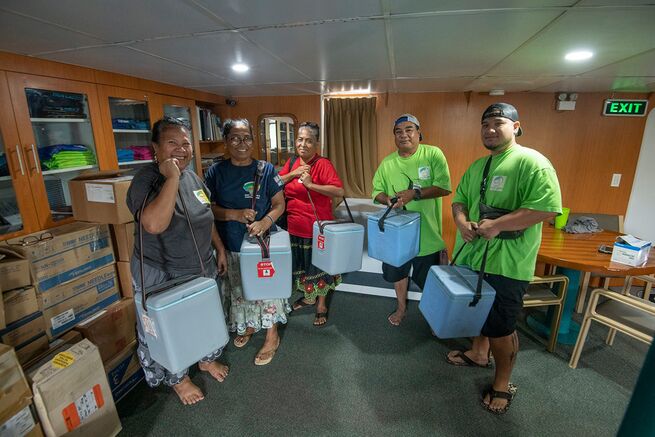
Scuba Liveaboard Aids COVID Vaccine Distribution in Truk Lagoon
With overnight accommodations and cold storage, it’s Chuuk’s ideal floating clinic.
By Alexandra Gillespie, Scuba Diving Magazine
Distributing a chilled vaccine across 74 tropical islands scattered in the Pacific ocean is a mean feat that keeps Micronesia’s president, David Panuelo, up at night.
Even at the best of times, his country’s healthcare system struggles — there is only one hospital in each state and residents are referred to the United States for specialized medical care.
“It's a health system that even the very best of times does not function nearly as well as most citizens would hope, certainly as much as we need or deserve, “ says Richard Clark, public information officer for the president’s office, pointing to children that have recently died in Micronesian hospitals of constipation. “Obviously nobody should die from something that's so easily solvable.”
Pre-existing conditions for developing serious COVID, like obesity and conditions like heart disease have proliferated in recent years.
“One of the fears of COVID-19 arriving into the country is that not only do we see a disproportionate amount of our medical professionals having to deal with the virus instead of other ongoing issues, but that we would see higher mortality rates from the rest of our population,” he says, adding nobody in the nation knows how to use the ventilators the U.S. provided them more than a year ago after the pandemic began.
President Panuelo sealed the nation’s borders completely last March to keep out the pandemic. This kept COVID from the islands, there has not been a single active case, but not even Micronesia’s own citizens can cross the blockade. An estimated 900 Micronesians have been stranded abroad for more than a year and counting. Full-scale repatriation efforts are untimely until the country reaches herd immunity, a 70 percent vaccination rate. Restarting tourism falls somewhere after that.
Into this nationwide crisis stepped one dive operator, determined to be a part of the solution.
Becoming a Vaccination Vessel
When Lenny Kolczynski heard in early January few vaccines had been distributed, he realized he could speed things up.
“The hospital [for the Micronesian state of Chuuk] is on the main island of Weno,” Kolczynski explains. “And that island is easy, because everybody can just drive over there and get their shots, but all the other islands, they have to have boat transport” to get the vaccines there.
As president of Odyssey Adventures, he was a man with the boat for the moment. The M/V Odyssey, his empty dive liveaboard, was idling around Chuuk.
Typically cruising the WWII wrecks in Truk Lagoon, no tourist had set foot on the ship in more than a year. But there was a skeleton crew already in place, including a captain, living in-country to tend to the vessel during the shutdown. Their salaries and utilities were already covered by a state stimulus for tourism operators impacted by the pandemic. And, even better yet, “we have reliable electricity, we have rooms for 16 passengers, and we can bring the boat” to any lagoon island, Kolczynski said.

Michael Gerken
Kolczynski connected with Chuuk’s COVID task force and Public Health Department. Two months later, the Odyssey anchored outside Chuuk’s Uman laden with Moderna shots and a medical team to administer them.
“They're able to do it a lot faster by not having to travel back and forth by a small skiff every day” from Weno to other Chuuk islands, says Kolczynski. His floating hotel lets the medical team work in the field for up to 10 days at a time.
Odyssey Adventures estimates their participation is cutting the time horizon to vaccinate Truk Lagoon by more than half. “That's better for everybody,” Kolczynski says.
All Hands on Deck
Chuuk state officials are alerting village elders and NGOs before the Odyssey arrives so they can let their neighbors know vaccines are coming to town. When the local health crew arrives, doctors, nurses and clerks set up a mobile vaccination station in a community hub. Risk communicators are also on hand to explain potential adverse vaccine reactions, what to do if COVID does ever reach the island, and counter any vaccination rumors spreading on social media.
On the first island, Uman, the team delivered about 650 vaccines, and then another 900 on the second island of Tonowas. The process has been repeated at Fefan, Param, and Tsis, in addition to a loop back to Uman to deliver the second round of Moderna shots. The Odyssey may be involved in a vaccination effort for Truk Lagoon’s western islands after distributing the second dose along the islands in the east. MMR vaccines are being distributed to children alongside the adult COVID inoculation effort.
“There's also a select group of people in these villages who are elderly or handicapped,” says the Odyssey’s Captain Mike Gerken. When the medical team finishes at the main vaccination station, “they start going around house to house and they administer the COVID vaccine directly in the person's home, which is pretty progressive.”
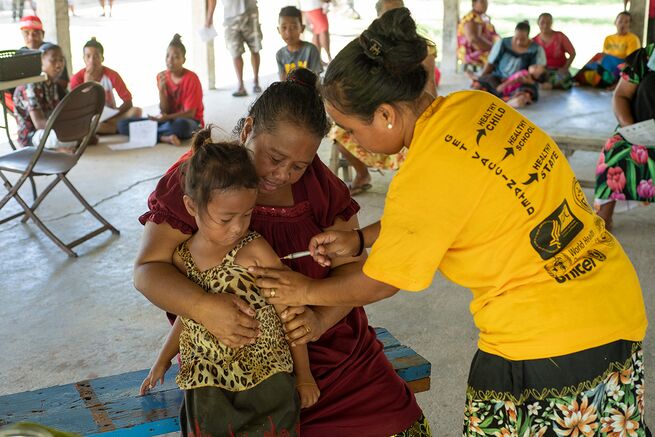
Michael Gerken
In the evening, the medical team returns to the ship for dinner and a good night’s sleep before repeating the effort at a new village the next day.
Behind the scenes, the Odyssey’s crew bustles to make the operation run. The chef prepares every cup of morning coffee and packs lunches the deckhands load into the skiffs, along with vaccine-packed coolers, to drive the medical team to the island. The housekeeper prepares the ship for their return. Gerken moves the ship between ports so the medical team wakes up where they need to be, and picks up fresh provisions in between outings.
“We are very fortunate that Odyssey and their management offer us their service, that they then provide that transportation [and] accommodation while doing the outreach services in the Truk Lagoon,” says Dr. Kennedy Remit, chief of staff at Chuuk’s Department of Health Services.
